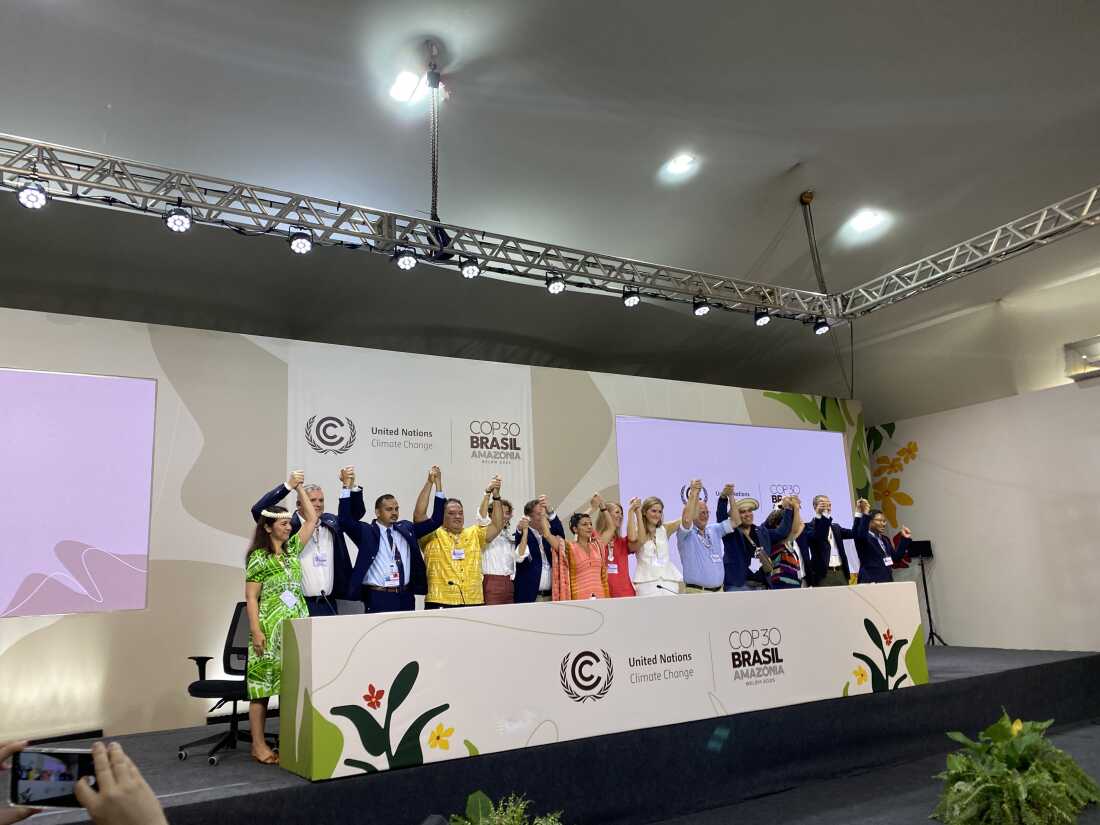André Corrêa do Lago, middle, the president of the COP30 local weather convention in Brazil, sat as negotiators huddled in last-minute deliberations on Saturday.
Andre Penner/AP
conceal caption
toggle caption
Andre Penner/AP
This yr’s United Nations world local weather convention in Brazil ended on Saturday with a proper settlement that failed to handle phasing out fossil fuels — the primary driver of worldwide warming.
The USA was conspicuously absent from this yr’s talks, referred to as COP30, after the Trump administration refused to ship a delegation to Belém, Brazil.
In the long run, the convention delivered solely modest progress on worldwide efforts to curb world warming and pay for the prices of adapting to a warmer planet.

Earlier within the week, greater than 80 international locations had demanded negotiators comply with a “roadmap” to transition the worldwide economic system away from fossil fuels. The group included many creating nations hit laborious by local weather change, together with the UK, Germany, and oil producers like Mexico and Brazil.
They stated world leaders want to start out drawing up concrete plans to ship on a landmark 2023 dedication to cut back using oil, coal and pure fuel.
Nevertheless, main fossil-fuel producers together with Russia and Saudi Arabia have opposed the creation of a course of or timetable to maneuver away from these vitality sources.
In the long run, the formal settlement didn’t embrace any point out of fossil fuels.

Activists display exterior of the COP30 local weather summit in Brazil on Friday.
Joshua A. Bickel/AP
conceal caption
toggle caption
Joshua A. Bickel/AP
The president of this yr’s summit, André Aranha Corrêa do Lago of Brazil, acknowledged that many international locations had needed a extra bold settlement. Two dozen international locations have stated they’re going to work alongside the U.N. in a brand new course of centered on transitioning away from fossil fuels.
In April, Colombia and the Netherlands plan to host the primary worldwide convention centered on the difficulty.
Ralph Regenvanu is local weather change minister of Vanuatu, an island nation dealing with rising sea ranges. He says the brand new convention is the important thing accomplishment to emerge in Belém.
“The textual content will not be nice, however at the very least we’ve got an final result,” Regenvanu says.
Listed below are the necessary take-aways from COP30.
No roadmap for fossil-fuel transition
The burning of fossil fuels stays the most important driver of worldwide warming. Nevertheless, local weather negotiators have struggled for years to agree on how international locations ought to handle the world’s reliance on these sources.
Two years in the past in Dubai, international locations for the primary time referred to as for a worldwide transition away from fossil fuels.
This yr, dozens of nations had needed world leaders to start out arising with plans to just do that. However in the long run, there was no such deal.

The ultimate settlement in Brazil says international locations perceive the “want for pressing motion” to make “deep, speedy and sustained” cuts in greenhouse fuel emissions, with none particular point out of fossil fuels.
Many international locations have been upset.
“There isn’t a [climate change] mitigation if we can not focus on transitioning away from fossil fuels,” stated Daniela Durán González, head of worldwide affairs for the Colombian Ministry of Setting and Sustainable Growth.
Setting a roadmap to section out fossil fuels will not be simple. The worldwide economic system nonetheless largely runs on oil, coal and pure fuel, although international locations are including large quantities of renewable vitality to their electrical grids.
A transition away from fossil fuels shouldn’t be imposed on international locations, particularly creating nations, Nigeria’s delegate advised the convention.
Nigeria is not going to help local weather plans “that can result in our sudden financial contraction and heightened social instability,” the delegate stated.
The planet will cross a essential temperature restrict within the 2030s
COP30 got here as a vital temperature goal slipped out of attain. Beneath the 2015 Paris Settlement, nations agreed to attempt to restrict world warming to 1.5 levels Celsius, or about 2.7 levels Fahrenheit, in comparison with temperatures within the late 1800s.
Scientists have discovered that dangers to individuals and ecosystems speed up with each tenth of a level past that restrict.
However a latest United Nations report concluded that the planet will probably exceed 1.5 levels Celsius of warming within the subsequent decade.

It’s nonetheless potential to restrict that overshoot, nonetheless. If international locations can lower general greenhouse fuel emissions in half by 2035, scientists say the planet would rapidly return to decrease ranges of warming.
The world will not be at the moment on monitor to satisfy that aim. Beneath present insurance policies, world emissions are anticipated to fall by simply 12% by 2035.
That is not almost sufficient to keep away from catastrophic warming, in response to science from the Intergovernmental Panel on Local weather Change.
“The science says we’d like 5 occasions that a lot,” says Alden Meyer, a senior affiliate at E3G, a local weather change suppose tank. “We’d like a 60% discount if we’ve got any probability of staying near the 1.5 Celsius temperature aim.”
Little progress on funding local weather motion
With the world dealing with worsening impacts from local weather change, consideration has more and more centered on methods to assist nations adapt. Meaning cash.
The problem is very pressing in poorer international locations, which usually undergo among the worst impacts from disasters, but bear little accountability for the air pollution that is elevating world temperatures.

Daniela Durán González, middle, head of worldwide affairs for the Colombian Ministry of Setting and Sustainable Growth, listens as delegates speak at a plenary session throughout the COP30 U.N. Local weather Summit, Saturday, Nov. 22, 2025, in Belem, Brazil.
Andre Penner/AP
conceal caption
toggle caption
Andre Penner/AP
Ultimately yr’s local weather summit in Azerbaijan, rich international locations agreed to a deal to supply creating nations with at the very least $300 billion a yr in financing by 2035. That is triple what poorer international locations have been promised beneath a earlier dedication. The deal struck in Azerbaijan additionally included a broader goal to spice up general local weather financing for creating international locations — together with from the non-public sector — to $1.3 trillion yearly inside a decade.
However rich international locations have been unreliable funders prior to now. Developed nations have been late assembly a previous funding dedication. And funds set as much as compensate international locations for climate-related damages are nonetheless largely empty, in response to U.N. Secretary Basic António Guterres.
In the meantime, creating nations face rising losses from excessive climate occasions.
Weeks in the past, for instance, Hurricane Melissa hit Jamaica as a class 5 storm, inflicting an estimated $10 billion in harm – equal to just about a 3rd of the nation’s gross home product, in response to Matthew Samuda, Jamaica’s minister of financial development and job creation.
The negotiations in Brazil did little make clear how extra funding will probably be offered. The ultimate settlement “requires efforts” to triple inside a decade the quantity of financing out there to assist nations adapt to a warmer world, like higher flood defenses and infrastructure that is constructed for extra excessive climate.
The deal additionally says international locations agreed to “urgently advance actions” to spice up local weather financing for creating international locations.
China spotlighted commerce points
With the U.S. absent from this yr’s talks, consideration turned to China, which is each the biggest present supply of local weather air pollution, and the worldwide chief in manufacturing inexperienced know-how like photo voltaic panels, batteries and electrical automobiles.
China has elevated discussions of commerce on the convention, says Li Shuo, director of the China hub on the nonprofit Asia Society.
“They occur to be the nation that produces the lion’s share of inexperienced and low-carbon merchandise. They usually have turn out to be now a champion of free commerce on this specific regard,” he says. “They need the remainder of the world to buy their merchandise.”

Organizers introduced the primary worldwide convention centered on transitioning away from fossil fuels. It is going to be hosted by Colombia and the Netherlands in April.
Julia Simon/NPR
conceal caption
toggle caption
Julia Simon/NPR
A brand new convention for phasing out fossil fuels
One of many key occasions on the convention was the announcement of a brand new convention devoted to the worldwide phase-out of fossil fuels.
The convention will probably be held in Colombia, a fossil gas producer, and co-hosted by the Netherlands – the birthplace of oil large Shell.
Colombia’s Setting Minister Irene Vélez Torres advised NPR that the brand new convention held in Santa Marta, Colombia, will probably be complementary to the U.N. local weather course of.
“The concept of the Santa Marta convention is to have this primary house through which we’re utterly clear that the phasing out [of fossil fuels] is important,” Torres says.
Meyer says he is not stunned that this new convention has emerged. “ I feel it displays the frustration of each international locations and NGOs who’ve seen little or no motion on this [United Nations] course of,” Meyer says.









